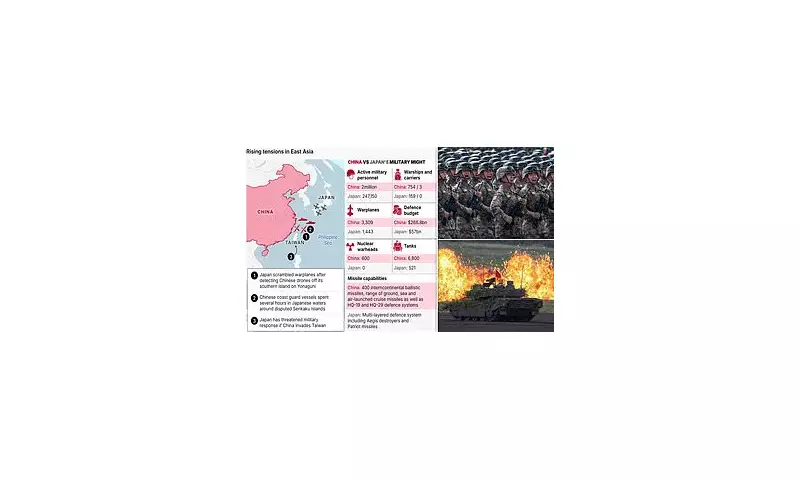
The longstanding rivalry between China and Japan has intensified into one of the most dangerous confrontations in recent Asia-Pacific history, with Tokyo explicitly warning Beijing it would respond militarily if China attempts to seize Taiwan.
Military Threats Exchange
Senior officials from both nations have engaged in increasingly hostile rhetoric, with Chinese President Xi Jinping reportedly ordering his military forces to prepare for a potential Taiwan invasion by 2027. In response, Japan's new Prime Minister Sanae Takaichi has declared that such an action would constitute a 'survival-threatening situation' for Japan, potentially triggering military intervention under the country's security laws.
The war of words reached alarming levels when China's defence minister Jiang Bin issued a stark warning: 'Should the Japanese side fail to draw lessons from history and dare to take a risk, or even use force to interfere in the Taiwan question, it will only suffer a crushing defeat against the steel-willed People's Liberation Army and pay a heavy price.'
Territorial Incursions and Military Movements
The situation escalated dramatically this week when Japan scrambled fighter jets after detecting what it identified as a Chinese military drone near Yonaguni, Japan's southernmost island located just 68 miles from Taiwan. Simultaneously, a formation of Chinese coast guard vessels sailed for hours through waters surrounding the disputed Senkaku Islands, known as Diaoyu in China, prompting furious protests from Tokyo.
Analysts confirm the timing is no coincidence, coming days after Prime Minister Takaichi told parliament that a Chinese attack on Taiwan could justify Japanese military response under the country's security framework. The 'survival-threatening' designation in Japanese security law means an attack on allies is treated as a direct threat to Japan itself.
Japan is now considering developing its own nuclear arsenal, a concept previously considered taboo for decades following the Hiroshima and Nagasaki bombings. The nation currently maintains three non-nuclear principles - not possessing, producing, or allowing nuclear weapons on its territory - but growing threats from nuclear-armed neighbours have sparked serious debate about revising this stance.
Historical Context and Current Stakes
The fraught relationship between China and Japan is deeply rooted in historical conflicts, including Japan's occupation of large parts of China during the 1930s and 1940s and atrocities such as the Nanjing massacre. Beijing regularly accuses Tokyo of downplaying wartime abuses, while Japan views China's rising military power as a threat to regional stability and American influence in East Asia.
Japan's new security strategy, adopted in 2022, explicitly describes Taiwan's stability as 'indispensable' to Japanese security and outlines plans to acquire 'counterstrike' capabilities, including missiles capable of hitting enemy bases. Intelligence services from the US and allied nations report that President Xi Jinping has instructed the People's Liberation Army to be ready for potential Taiwan invasion by 2027.
Professor Allen Carlson, a Chinese foreign policy expert at Cornell University, told Daily Mail that 'the prospect of war is more present than has been the case in quite some time.' He noted that while there's no immediate indication China plans to invade Taiwan, Beijing is actively pressuring Japan to retreat from its strengthened security commitment to the island.
Military Capabilities Comparison
The military disparity between the two nations is substantial. China's armed forces include approximately two million active personnel with an official defence budget of $266.8 billion, operating 3,309 warplanes, 6,800 tanks, and 754 warships including three aircraft carriers. Western estimates suggest China possesses about 600 nuclear warheads and 400 intercontinental ballistic missiles.
By comparison, Japan maintains approximately 247,150 active military personnel with a $57 billion annual defence budget. Its forces operate 1,443 warplanes, 521 tanks, and 159 warships, though it has converted two helicopter carriers to operate F-35 B jets. Japan currently has no nuclear weapons but maintains sophisticated missile defence systems.
Professor Carlson assessed that 'in terms of economic conflict, China is in a stronger position, especially vis-à-vis its ability to impose controls over the export of rare earth metals to Japan. In the immediate theatre, Japan has some advantages, but overall China's naval capabilities far exceed those of Japan.'
Regional Implications and Global Concerns
The escalating tensions have prompted both nations to issue travel advisories, with Beijing discouraging travel to Japan and Tokyo warning its citizens in China to avoid crowded public places. China has also suspended releases of Japanese films, adding symbolic weight to an already strained relationship.
If conflict erupts, analysts predict Japan would likely receive support from the United States and Australia, with potential logistical assistance from the Philippines. China could count on its increasingly close partnership with Russia, formalised in a 'no limits' declaration, while North Korea would probably cheer China on and potentially threaten US bases in Japan.
Professor Carlson warned that a conflict between China and Japan would have 'an incredibly destabilising impact' globally, particularly since it would demand US involvement, potentially pitting the world's two largest powers against each other. However, he expressed doubt that either Chinese President Xi Jinping or potential US President Donald Trump would have interest in escalating to full-scale military engagement.
Despite the apocalyptic scenarios, both nations face significant domestic challenges that might deter open warfare. China's economy shows signs of slowing with foreign investment hitting a 30-year low in 2024, while Japan confronts an ageing society and shrinking recruitment pool that would complicate sustaining a prolonged conflict.





